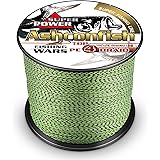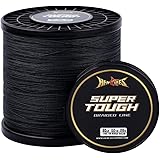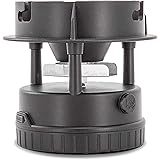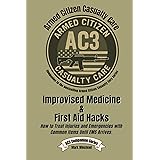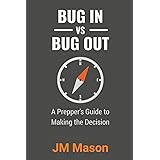Studies show that respiratory symptoms like coughing are incredibly common, even during outdoor excursions, affecting a significant percentage of campers and hikers. The stark reality of being caught unprepared is vividly, if uncomfortably, illustrated in the video above, where individuals grapple with a rather unconventional remedy: soy sauce cough medicine. While the visual might induce a cringe, it underscores a crucial point for anyone venturing outdoors: preparedness for minor ailments can make or break an experience. But is soy sauce truly a viable option for soothing a cough?
The idea of using household items for medicinal purposes often sparks curiosity, especially in survival or camping scenarios where traditional pharmacies are out of reach. For centuries, various cultures have experimented with natural ingredients to alleviate symptoms. However, not all folk remedies are created equal, and some, like the direct consumption of pure soy sauce for a cough, can lead to the very strong reactions seen in the accompanying video.
Understanding the Soy Sauce Cough Medicine Trend
The concept of soy sauce as a cough remedy isn’t entirely baseless, but it’s often misinterpreted. Historically, some traditions, particularly in parts of Asia, have used a concoction of soy sauce mixed with honey or other ingredients as a soothing elixir for a sore throat or mild cough. The key distinction here is the addition of honey, a known natural cough suppressant and demulcent that coats the throat.
Pure soy sauce, on the other hand, is a different story. Its extremely high sodium content and pungent flavor are far from soothing for an irritated throat. Imagine yourself deep in the wilderness, already feeling unwell with a persistent cough, and then subjecting your system to a concentrated dose of salt. The body’s natural reaction, as depicted in the video, is often a strong gag reflex or retching, which can exacerbate irritation rather than alleviate it. This experience highlights the critical difference between a traditional, balanced remedy and an unverified, potentially unpleasant experiment in a pinch.
Why Pure Soy Sauce Might Cause More Harm Than Good
While the desperate attempts in the video are understandable when facing discomfort in an isolated setting, relying on pure soy sauce for cough relief presents several drawbacks. Firstly, the sodium content is exceptionally high. Consuming large amounts can lead to increased thirst, dehydration, and electrolyte imbalance, which are precisely what you want to avoid when trying to recover from an illness, especially in an outdoor environment where hydration is paramount.
Secondly, the intense taste and consistency can trigger gagging and vomiting, as witnessed. This reaction can further irritate your throat and digestive system, potentially making you feel worse. Instead of providing the desired relief, pure soy sauce can introduce new discomforts, distracting from genuine recovery efforts. This highlights the importance of distinguishing between anecdotal suggestions and remedies with a basis in traditional practices or scientific understanding.
Safe and Effective Natural Remedies for Coughs in the Wild
Fortunately, if you find yourself battling a cough during an outdoor adventure, there are far safer and more effective natural alternatives to explore before resorting to desperate measures like pure soy sauce cough medicine. These remedies are often easy to carry or source in the wild, providing genuine comfort without unwanted side effects.
The Power of Honey for Cough Relief
Perhaps the most well-known and scientifically backed natural cough remedy is honey. Numerous studies have shown that honey can be more effective than some over-the-counter cough medicines, especially for children. Its thick, viscous nature coats the throat, reducing irritation and providing immediate soothing. For outdoor enthusiasts, carrying a small container of honey packets or a squeeze bottle is a compact and highly effective solution. Mixing it with warm water, lemon, or even a bit of herbal tea can create a potent, pleasant cough syrup.
Staying Hydrated is Key
One of the simplest yet most overlooked remedies for any respiratory ailment is hydration. Keeping your throat moist and your body well-hydrated helps to thin mucus, making it easier to expel and reducing irritation. Water is your primary tool, but warm liquids can be especially comforting. Consider packing a few tea bags—ginger, chamomile, or peppermint can offer additional soothing properties and a pleasant taste. Imagine the relief of a warm mug of ginger tea after a chilly day on the trail.
Harnessing Nature’s Anti-inflammatories: Ginger
Ginger is another powerhouse in the natural remedy toolkit. Known for its anti-inflammatory properties, ginger can help reduce throat irritation and potentially alleviate coughing. If you have access to fresh ginger, slicing it and steeping it in hot water makes a fantastic tea. Even carrying dried ginger powder can be beneficial; a small amount mixed into warm water or honey can provide a comforting kick. This root has been a staple in traditional medicine for centuries, proving its worth for various ailments.
Prevention: Your Best Defense Against Outdoor Illnesses
Ultimately, the best medicine is prevention. Before heading out on any camping or survival trip, consider packing a basic first-aid kit that includes over-the-counter cough drops, lozenges, and perhaps a small bottle of a non-drowsy cough syrup if appropriate. Dress in layers to protect against sudden temperature changes, maintain good hygiene to prevent germ spread, and ensure you’re well-rested and nourished before your adventure begins. A strong immune system is your first line of defense against any illness, including a pesky cough.
Knowing When to Seek Professional Medical Attention
While natural remedies can provide significant relief for minor coughs, it’s crucial to understand their limitations, especially in a survival context. If your cough is severe, persistent, accompanied by a high fever, difficulty breathing, chest pain, or changes in phlegm color, these are red flags. In such scenarios, home remedies, no matter how effective for minor cases, are not sufficient. Knowing when to activate emergency protocols, use satellite communication, or shorten your trip to seek professional medical attention is a vital survival skill. No soy sauce cough medicine, or any other folk remedy, should ever delay necessary medical care.




